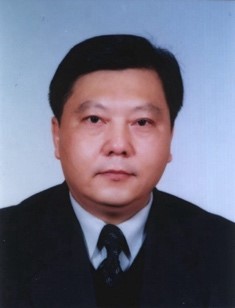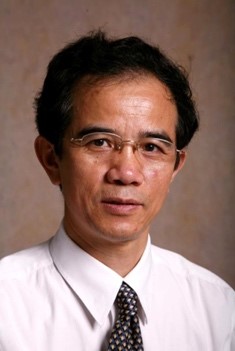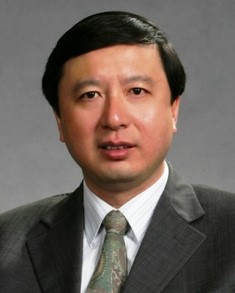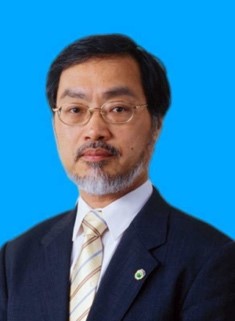Four Professors of BIT Elected as Academicians of CAS or CAE
Translator:News Agency of BIT
Editor: News Agency of BIT Zhao Jie
On November 27, Chinese Academy of Engineering (CAE) announced its addition of academicians in 2017. On November 28, Chinese Academy of Sciences (CAS) announced its addition of academicians in 2017. Professor Wu Feng of School of Materials Science and Engineering (SMSE), Beijing Institute of Technology was elected as a CAE academician (divisions of Chemical, Metallurgy, and Material Engineering). Professor Sun Fengchun of School of Mechanical Engineering was elected as a CAE academician (division of Mechanical and Transportation Engineering). Professor Chen Jie of School of Automation was elected as a CAE academician (division of Information and Electronic Engineering). Professor Toshio Fukuda (福田敏男) of School of Mechatronical Engineering was elected as a foreign CAS academician (division of Technical Science). Up to now, there are 20 academicians of CAE and CAS academicians working at our university.
New Academician Profiles

Wu Feng, male, a professor and doctoral supervisor of BIT, was elected as a CAE academician in 2017.
He has been engaged in the R&D of new secondary batteries and relevant energy materials for years. He was the first person who proposed the idea to utilize light element, multi-electron, multi-ion reaction system to realize super-high energy density of batteries. He has developed a new system of high specific energy secondary batteries and key materials, receiving attention and high praise from international peers. Moreover, he has independently developed a series of key new lithium-ion battery materials, new battery preparation processing, and battery safety technology, providing technical support for China's lithium-ion battery industry to upgrade and access to international high-end product market. He proposed to improve battery safety by the synergy of a series of key materials and invented safety electrodes, composite ceramic polymer membrane, and an electrolyte system with flame retardancy and electrochemical compatibility. He first put forward the concept of safety threshold boundary of battery system, and developed relevant identification and control technology. He invented a lithium-containing hydrogen storage alloy and its preparation method, breaking the foreign monopoly on hydrogen storage alloy. He presided over the creation of China's first nickel-metal hydride battery pilot base to achieve the integration of key technologies for industrialization. And he designed and completed China's first automatic production line of nickel-metal hydride battery for demonstration. He developed a series of nickel-hydrogen battery packs which are successfully applied to a variety of hybrid vehicles. Centering on major national needs, he explored the technological integration among different secondary battery systems and made breakthroughs in battery reaction theory, key materials, and engineering technologies, and making important contribution to the industrialization of secondary batteries in China. To date, he has cultivated 56 PhDs and 50 masters, many of whom have turned to be the technical backbones of relevant fields in our country. Some of the team members of 973 and 863 basic and applied research teams led by him have become the leaders in the fields of secondary batteries and new energy materials in China.
He won a Second Prize of National Technological Invention Award and a Second Prize of National Science and Technology Progress Award, as well as, 4 international awards and 12 provincial and ministerial science and technology awards. In 1992, he received the special government allowance issued by the State Council. In 2012, he received Science and Technology Progress Award of Ho Leung Ho Lee Foundation. In 2014, he was elected as an IEAS Academician. In 2016, he won the Lifetime Achievement Award issued by IALB for the first time. In 2017, he was elected as an academician of The Asia-Pacific Academy of Materials. He won the titles like First-class Teacher of University of State Commission of Science and Technology for National Defense Industry, Principal Investigator of "511 Talent Program" of Science and Technology Industry of National Defense, Expert with Special Contribution to China's Battery Industry, and Model of Teacher's Professional Ethics of BIT. He had been employed by Ministry of Science and Technology as the chief scientist for the new secondary battery program for three consecutive phases. He was awarded the honorary doctorate of science by the University of Massachusetts Boston. And he had delivered more than 30 reports at relevant international academic conferences. 389 papers had been published on famous academic journals such as Adv. Mater. and Nature Communications, including 176 papers with IF > 4.0. 18 papers had been regarded as highly cited papers by ESI. His papers had been cited by SCI for 6,682 times. He served as the chief editor of two academic books, and participated in the edition of a number of books. He received 81 national invention patent licenses.

Sun Fengchun, male, a professor and doctoral supervisor of BIT, was elected as a CAE academician in 2017.
He has been engaged in the research of vehicle electrification technology in the field of vehicle engineering. He created engineering technology system of electric commercial vehicle consisting of "electric vehicle, battery charging/changing station, and remote real-time monitoring". He created a national engineering laboratory for electric vehicle, and a national supervision and management platform of new energy vehicle operation. He has conducted pioneering R&D and achieved a series of results in terms of system dynamics of electric vehicle, energy conservation and regenerative brake control, automatic mechanical adjustable speed drive control, battery system and energy management, automatic and rapid battery box replacement, and electric vehicle operation safety monitoring. He invented key technologies of powertrain system, and presided over the development of China's first ultra-low floor electric bus. The bus platform has become a classic design in the industry. Through technical cooperation with 21 enterprises, industrialization has been realized. The electric bus won China's first product announcement. He has made great contribution to develop internationally advanced technologies, internationally leading energy consumption, and world first production and sales volume of Chinese electric bus, and brought about huge social, economic, and environmental benefits. He served as the chief engineering to develop key technologies of hybrid, wire-controlled, multi-wheel distributed electric drive. He developed the prototype of tracked armored vehicle with hybrid power and electric drive and for demonstration and verification. He completed the amphibious performance test and 3000km reliability assessment, making Chine one of the few countries that master this key technology and promoting upgrade and development with great strides of powertrain technology for military vehicles in China. He invented technologies of battery management, battery charging/changing station, and remote real-time monitoring. He created standards for the operation of electric vehicles. He presided over the development of the first automatic rapid battery charging/changing station of electric commercial vehicles in the world. He took the lead to implement national key transport demonstration projects with zero-emission for Beijing Olympic Games, Shanghai World Expo, Guangzhou Asian Games, and APEC. He has effectively promoted the development of national strategic emerging industries. He put forward the three-level regulatory technology system of new energy vehicle operation consisting of the state, local governments, and automobile enterprises. He created the only national regulatory platform for new energy automobiles to supervise the relevant platforms of local governments and enterprises and provide data basis for national energy conservation, emission reduction, and financial subsidies. The electric bus with complete independent intellectual property rights and complete technologies and products for battery charging/changing stations have passed through international certification and been exported to the EU for the first time.
He won 65 national invention patent licenses. As the first inventor, he won two Second Prizes of National Technology Invention Awards, one Second Prize of National Science and Technology Progress Award, one second prize of national teaching achievement, and several provincial and ministerial awards. He published 8 books and more than 200 academic papers which have been cited for over 6,000 times, including 11 papers being regarded as highly cited papers by ESI and 3 were included in the list of "100 Most Influential International Academic Papers in China".
In 1994, he was included in the "Trans-Century Talent Program" of Ministry of Education of the P.R.C. In 1995, he received special government allowance. In 1996, he was awarded "May 4th" Medal of Beijing. In 1999, he was employed as one of the first batch of "The Yangtze River Scholar" and included in "New Century Talents Project". In 2000, he won the" Advanced Worker" Medal. In 2006, he won "Excellent Scientist Talent Award in China's Automotive Industry". In 2007, he received Science and Technology Progress Award of Ho Leung Ho Lee Foundation. In 2008, he won the title of "Advanced Individual of Scientific Olympics". In 2012, he won the title of "Beijing Top Ten Science and Technology Talents". Moreover, he won the titles of "Outstanding Teacher" of China, Beijing, and BIT. He has trained 97 postgraduates. These postgraduates have all grown up to be technical backbones or leading talents in the field of new energy vehicles. Among them, there are one "National Model Worker", one expert in the special group of "New Energy Vehicles" of national key research and development programs, one included in "New Century Talents Project", one "Excellent Doctor of Beijing", one included in "One Thousand Excellent Young Talents", and 10 winners of National Science and Technology Award.
He currently serves as Vice Chairman and member of SAE-China, Vice Chairman of China Electrotechnical Society, Beijing municipal government consultant, and the team leader of the technical experts in the field of automobile for Beijing Science and Technology Winter Olympics. And he served as an expert of National New Energy Vehicle Expert Group and Beijing City Chief Expert. He works as the editor of several domestic and foreign academic journals like Applied Energy. He served as the chairman of major international academic conferences and program committees. And he had been invited to deliver a report at many international academic conferences.

Chen Jie, male, a professor and doctoral supervisor of BIT, was elected as a CAE academician in 2017.
He has long been engaged in the teaching and research related to control science and engineering. He conducts deep research in multi-index optimization and control and multi-agent collaborative control of complicated systems in a dynamic environment. He proposed and created the theories and methods for hybrid intelligent optimization and stability of distributed collaborative control. And he closely combined the research in the field with device system construction. He overcame the technical bottlenecks like rapid and autonomous acquisition of information on field positions and distributed coordinative control of multi-weapon platforms. The devices developed have been massively installed. With advanced technologies, he has promoted the innovation of combat mode. He has undertaken many projects like National Natural Science Foundation Projects, 973 Plan, advanced researches, and model development projects.
In recent years, as the first inventor, he won one Second Prize of National Natural Science Award, two Second Prize of National Science and Technology Progress Award, one First Prize of Natural Science Award of Ministry of Education, one First Prize of Technological Invention Award of Ministry of Education, and two First Prize of National Defense Science and Technology Progress Awards. He had published over 80 SCI papers and received over 40 invention patent licenses as the first inventor. He published three books, that is, Stability Analysis and Application of Time Delay System, Exploration on Intelligent Optimization―Development Balance Theory and Method, and Control of Collaborative and Swarming Motility Control of Multi-agent System, and translated one book entitled Discrete-time Control System. Dr. Xin Bin, under his guidance, won the 18th "Guan Zhaozhi Award". Xin Bin's doctoral dissertation had been included in Beijing outstanding doctoral dissertations and outstanding doctoral dissertations of Chinese Association of Automation. Dr. Zha Wenzhong's doctoral dissertation had been nominated to be included in outstanding doctoral dissertations of Chinese Institute of Command and Control. Dr. Wang Gang's paper won 2017 Eusipco Best Student Paper Award.
He is a winner of National Outstanding Youth Science Foundation, specially employed professor of "The Yangtze River Scholar" of Ministry of Education, and the leader of the innovative research group for "optimization, control, and decision-making of complicated land-use weapons" of National Natural Science Foundation, as well as the leader of innovative team of The Yangtze River Scholar for "Synergy and Control of Complex Motion Body under Strong Constraints". Furthermore, he is a chief expert of 973 Plan and the chief designer of a key model project. He is a national talent included in "New Century Talents Project". He is a national outstanding scientific talent and receives special allowance of the State Council.
He currently works as the Director of the State Key Lab of "Intelligent Control and Decision-making of Complex Systems". He is a member of the Group of Control Science and Engineering of the Seventh Discipline Evaluation Group under the Academic Degrees Committee of the State Council. He is a member of the Seventh Science and Technology Committee of Ministry of Education. He is an expert in a certain field Scientific Technology Committee of Central Military Commission. Also, he serves as Vice chairman of China Association of Automation, Deputy Director of Technical Committee on Control Theory, Chinese Association of Automation, and a standing director of Chinese Association for Artificial Intelligence. And he serves as Associate Editor of System and Control, IEEE Trans. on Cybernetics, International Journal of Robust and Nonlinear Control, Science China --Information Sciences, Control Theory and Technology, Managing Editor of Journal of Systems Science & Complexity, Associate Editor-in-chief of Firepower and Command Control, editorial board member of Information and Control, and member of Academic Committee of State Key Laboratory of Industrial Control Technology.

Toshio Fukuda, male, a professor and doctoral supervisor of BIT, was elected as a CAS academician in 2017.
He has long been engaged in the research of micro-nano manipulator and bionic robot. He is a world recognized pioneer and leader in the field of biomedical micro-nano manipulator. His main academic achievements include creation of micro-nano manipulation of carbon nanotubes and development of nano-sensors and nano-actuators, laying a foundation for the research of micro-nano robot system. He proposed the micro-nano robot system based on environmental scanning electron microscope, which can realize the analysis of single-cell biological characteristics, in-situ detection under nanoscale conditions, and micro-nano operation of biological cells. By studying the swinging of apes in the branches, he proposed a swing controller which allows a robot simulating ape to naturally and smoothly move between several consecutive steps, playing a significant role in promoting robot natural movement and intelligent control research.
He has served a dozen of internationally important academic posts, published 11 monographs and over 200 SCI papers which have been cited for over 4,222 times, including one paper with the highest citation times of 448. He won 80 significant international academic awards, including IEEE Robotics and Automation Technical Field Award.
He had long served as a professor at Department of Mechanical Engineering, Nagoya University, Japan, and was elected as an academician of Japanese Academy of Engineering. In 2008, he was hired as an oversea scholar of "111 Scholar Introduction Plan" of BIT robotics field. In 2012, he was included in the first batch of "1000 Excellent Foreign Talents". Since 2012, he has worked at BIT full-time and hired as the Director of Academic Steering Committee of High-grade, Precision, and Advanced Industrial Product Innovation Center of Beijing Intelligent Robot and System. Due to his great contribution to train talents and make innovative researches for China, he won Friendship Award granted by the Chinese government.
The additions of academicians by CAE and CAS are conducted once each two years. The addition in 2017 has been formally initiated in January.
According to CAE website, the total number of new CAE academicians in 2017 do not exceed 75 which are nominated by China Association for Science and Technology and by academicians. There are 533 effective candidates. Through scientific and rigorous review procedures, finally, 67 new academicians had been elected, including 9 in the field of Mechanical and Transportation Engineering, 8 of Information and Electronic Engineering, 9 of Chemical, Metallurgy, and Material Engineering, 7 of Energy and Mineral Engineering, 8 of Civil, Water Conservancy, and Construction Engineering, 6 of Environment and Light Textile Engineering, 8 of Agronomics, 7 of Health & Medicine, and 5 of Engineering Management.
According to CAS website, CAS has conducted the selection of foreign academicians since 1994, in order to promote foreign scholars and experts who make great contributions to the scientific and technological undertaking of China and enjoys extremely high academic status internationally. Foreign scholars and experts can be nominated as academician candidates by the recommendation of CAS independently or by joint recommendation. In 2017, through scientific and rigorous review procedures, finally, a total of 16 foreign academicians had been selected.

